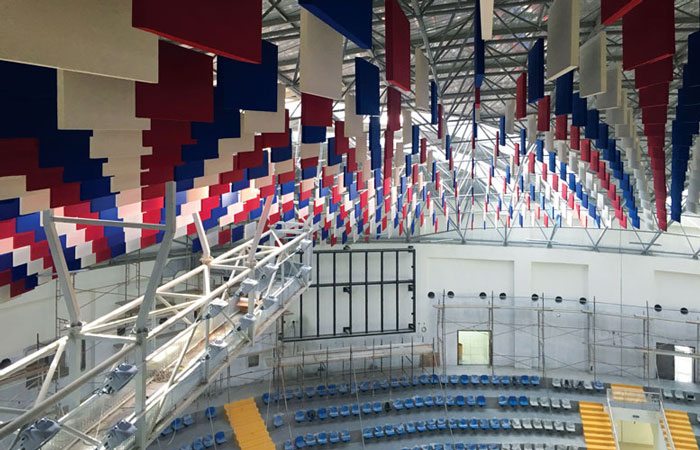Sound advice from acoustics consultants
Experts in acoustics explain the value-add that this discipline brings to projects across the spectrum

While most architectural masterpieces recognise the accomplishments of the architects, designers and engineers involved, the value added by acoustic consultants often goes silently unnoticed. In fact, the only time this discipline truly steps into the spotlight is on projects concerning the performing arts, such as concert halls and theatres.
But despite popular belief, there are a number of benefits of appointing an acoustic engineer across a variety of projects.
To start with, acoustic consultation can ensure that a project complies with certain local and international aural standards that determine whether the environment within a space is acoustically fit for purpose or not, says AlAnwar Dawood, senior consultant at PMK International.
Additionally, through the process of acoustic design, a project can also obtain certain credits under the green building assessment methods, which many developments now require.
Using educational developments as an example, Ian Knowles, director of Acoustics at Arup, points out that hiring an acoustic consultant can affect the quality of learning by developing a conducive environment for school children to study in.
Similarly, on healthcare projects these specialists play a vital role in creating an environment that can help speed up the recovery process of patients. In hotels, they ensure that clubs and other noisy locations are soundproofed, and in residential projects they minimise the vibrations produced by MEP systems that could disturb residents, such as internal plumbing pipes.
“Our job as consultants is to make sure that people get the most out of a building. For instance, in an office environment, acoustic consultation is used to help boost productivity by creating an atmosphere that is not too loud, and at the same time not too quiet either.
“On the other hand, in performing arts venues, the emphasis is on achieving the best acoustics possible while maintaining the architectural vision. In sports facilities, including stadia, the crowd excitement and player interaction and response drives the acoustic design.”
Acoustic consultants can also have a positive impact on the design of a development. To begin with, these experts must be brought in right at the start of a project, says Paul Schwarz, principal of Acoustics at Design Confidence. This is because an acoustics engineer can provide valuable inputs to incorporate good acoustic elements at the pre-concept stage where the location, orientation and use of the space are being considered.
Evaluating and comparing the impact that an acoustics specialist has on a performing arts project to on an educational institution, he says, “If you look at a concert hall, opera house or an auditorium, the need to achieve high performance standards will invariably have the design of it led by an acoustic engineer. In fact, their inputs will be vital in the structural design and orientation of the building, as these aspects play a key part in ensuring that the finishes are allowed to perform to their optimal level.
“However, when considering projects like school halls, office meeting rooms or university lecture rooms, these spaces are often subject to many financial, special or operational constraints, and their design is most often led by the interior designers or architects.
“Unfortunately these are people who have little or no knowledge of acoustic principals and are restricted by the above factors. Thus inevitably a standard room is built, and is forced to try and meet acoustic needs, rather than it being designed specifically as an acoustic space.”
Thomas Philip, technical sales director at The Moov Group, elaborates, saying that a school or university classroom must be acoustically developed to avoid reverberations during a lecture.
“To put it in technical terms, classrooms have what we call hot spots and cold spots. As the distance between the professor and student increases, it becomes more difficult for the students in the corners and at the back to hear what’s being taught, because the decibel or DB levels tend to fall in these areas. But appointing an acoustics specialist can help avoid any audio issues like this.”
Besides ensuring the proper aural functioning of a space, another reason to employ these consultants early on is that they can also provide valuable feedback on the feasibility of certain elements decided on during the conceptual budget stage of a project.
Many new developments have moved from the conventional use of block works to pre-cast walls. In fact, Philip points out that he’s noticed a lot of other new materials also being introduced to speed up the construction process. While these may achieve that, they could also have major effects on acoustics.
“For example, a block work that is 200mm thick acts in a different way, as far as soundproofing is concerned, as compared to a normal pre-cast wall where the thickness is less and the materials used are different. While this may not present any issues at the construction stage, they are realised once a project is handed over to a client.
“This is why an acoustics study needs to be done by a professional before construction begins. What may be deemed as an unnecessary expense at the start could actually save the developer from costs incurred later on when retrofitting is needed, and where constraints like space and access come into play.”
Considering the many benefits of appointing an acoustic consultant on a project, why are they still so undervalued in the Middle East?
For one, Dawood says the biggest challenge to be overcome is the lack of understanding of the discipline and the misconception that acoustic consultants increase the cost of the project.
Philip agrees and points out that they are often treated secondary to other civil consultants, be it MEP, HVAC or structural engineers.
“Budgets don’t often consider separate acoustic consultants, because developers feel that these needs, if any, can be taken care of by a contractor or supplier who can conduct the study and execute the requirements. The Middle East market isn’t that mature either, so not everyone is aware of the different applications of acoustic systems. They don’t understand one solution can’t be applied to solve all problems.
“Acoustical issues, like any other, need to be understood by a specialist and then treated in a tactful manner. Additionally, I’d say that while there are many good acoustic consultants in the region, more are definitely required.”
At the other end of the table, Knowles points out that awareness of the value of acoustics is definitely growing.
“We have been involved in a number of projects in the Middle East, for example working on performing arts buildings, metro stations, retail, residential, sports stadiums and office buildings and on mosques, and unlike earlier, I think people are a lot more conscious of the benefits of good acoustics. Certainly the Middle East has a reputation for pushing the boundaries of what is possible in terms of architecture, but to really lead on new buildings, acoustics needs to be a key element of the thinking.”
Schwarz seconds that, saying a number of architects, interior designers, developers and project managers have learned the hard way the implications of not incorporating acoustic engineering at the right stage.
One thing to be watched out for that could lead to this discipline being undervalued, is that often manufacturers and suppliers become an integral part of the design team, as opposed to specialised acoustic consultants, says Dawood.
“While these specialised manufacturers or suppliers are aware of the products and systems, they might not be aware of the overall needs and requirements of the projects. When this happens, the benefit of the client and project may be superseded by their own interest in selling their products,” notes Dawood.
Despite these constraints and issues, efforts are being made by acoustic professionals in the region to spread awareness among their industry peers and governing bodies about the benefits of their practice.
In fact, a body called the Middle East Acoustics Society was formed in 2008 by a small team of acoustic professionals, currently chaired by Schwarz. This organisation has grown over the years to over 40 members consisting of consultants, suppliers, engineers and local authority representatives, all with a keen interest in this space.
The society also comprises a technical committee whose purpose is to promote professional engineering among its members, advise the executive committee on all technical matters, and act as a forum for coordinating the technical and research activities of the society.
As a member of the organisation, Philip says, “This organisation is working towards being in a position to advise the government as well. Since acoustics isn’t a very big area, there aren’t any strict standards that are in place. There are values that need to be followed, but they aren’t as broad as they should be. In fact, I feel this is something that should be taken seriously and included in the building codes too.”
With awareness of the implications of inadequate acoustic design growing steadily, developers and contractors are becoming more conscious of the need for this specialisation.
“As Middle Eastern countries increasingly look to ensure the wellbeing of their citizens, I would predict that acoustics consultancy will become far more important across a number of construction projects, and not just the landmark performing arts venues,” says Knowles.
Dawood agrees, saying that although the trend to hire acoustic consultants with low fees may continue on many small or low to mid-scale projects, large, more complex and prestigious projects should see a change.
“For the latter, where acoustics is identified by the client and designer as important, acoustic consultants will have the opportunity to offer a decent level of service and secure reasonable fees,” he says.
Sharing this optimism, Philip thinks the future of acoustic consultation is bright. In fact, business-wise, they’ve seen more jobs this year than last, and general market movement is upward.
Schwarz shares his concluding thoughts as well.
“Developers are quickly learning that with a growing number of educated and experienced renters and buyers, expectation of building quality and performance is also increasing. Developments which overlook important aspects of design, such as acoustics, are finding that they cannot expect to achieve premium price tags without premium quality design.
“As such, the future looks good for those who are knowledgeable and practical with their professional services.”

























